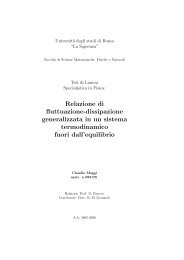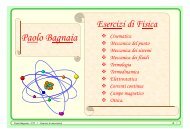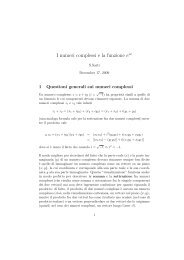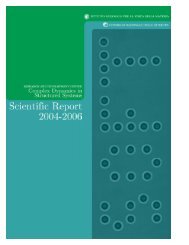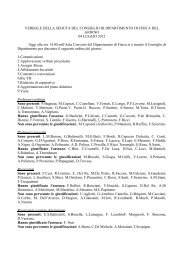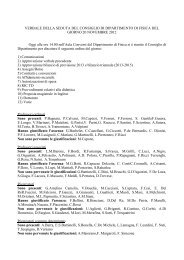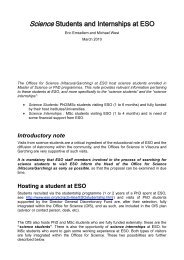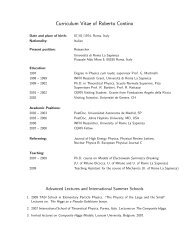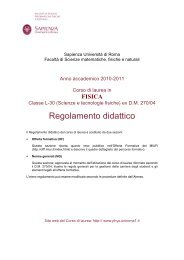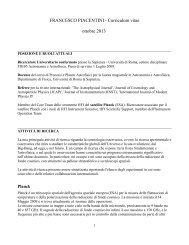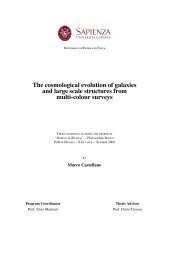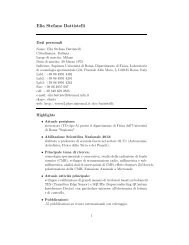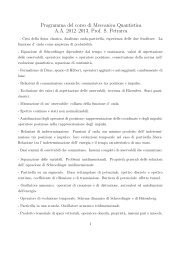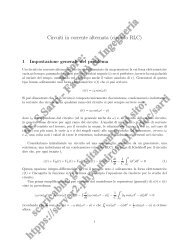download report - Sapienza
download report - Sapienza
download report - Sapienza
Create successful ePaper yourself
Turn your PDF publications into a flip-book with our unique Google optimized e-Paper software.
Scientific Report 2007-2009<br />
History of Physics and Physics Education<br />
H3. Physics education: new perspectives on the problem of the<br />
transition from classical to quantum physics<br />
Its well known that the problem of teaching Quantum<br />
Physics at school, is of outstanding priority in the<br />
international research on Physics Education. Yet, the<br />
various groups of research dont share the same opinions.<br />
The debate is still open. The group of Rome is improving<br />
a path-proposal starting from substantial changes in<br />
the teaching of Classical Physics. Two aspects of the<br />
entire question are being stressed.<br />
1. The links and the gaps between the Classical and<br />
the Quantum views of the physical world;<br />
References<br />
Ċ. Tarsitani, Dalla fisica classica alla fisica quantistica,<br />
Editori Riuniti Univ. Press, Roma (2009)<br />
Authors<br />
C. Tarsitani<br />
2. The formal structure of Quantum Physics;<br />
3. The conceptual interpretation of the formalism.<br />
As regards the first issue, we think that a meaningful<br />
teaching of Quantum Physics cannot be actuated if the<br />
main lines of the conceptual changes in the transition<br />
from the Classical to Quantum views would not explicitly<br />
treated. From this point of view, the research on<br />
teaching must be integrated with historical and epistemological<br />
knowledge. Our work is oriented towards the<br />
construction of a clear insight of the deep conceptual<br />
problems that emerge in the period 1890-1925, also by<br />
individuating some important experimental situations in<br />
which these problems appear in a form easy to understand.<br />
As regards the second issue, its well known that the<br />
Quantum formalism has a conceptual meaning in itself.<br />
Our research aims to find strategies for a simple approach<br />
to Quantum formalism, which can be used also at<br />
school level. The research is oriented to create a logicalmathematical<br />
structure, based on a simplified form of<br />
the notion of Hilbert space. We develop the fact that<br />
Quantum Physics, at an elementary level, is based on a<br />
linear theory, which in turn finds its natural representation<br />
by means of vector spaces. The mayor obstacle to<br />
this development seems to be the use of complex numbers.<br />
We have developed a formal structure based on<br />
classical linear systems, that can be described in terms<br />
of the well-known Diracs notations. Therefore we are<br />
looking for a better integration between the teaching of<br />
Physics and the teaching on Mathematics.<br />
As regards the third issue the research is oriented<br />
to the examination on the various misconceptions that<br />
infest many textbook introductions to Quantum Physics<br />
and are deeply impressed in the understanding of the<br />
subject of the majority of students. Obviouly this<br />
kind of research is based on an accurate analysis of<br />
the debates that followed the formulation of the new<br />
theoretical structure. A new line of research regards<br />
the impact of Quantum Field Theory on the conceptual<br />
issues raised by the above traditional debates. This last<br />
research is carried on in collaboration with the Group of<br />
the Department of Physics of the University of Bologna.<br />
<strong>Sapienza</strong> Università di Roma 174 Dipartimento di Fisica



